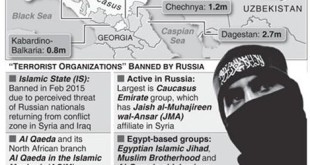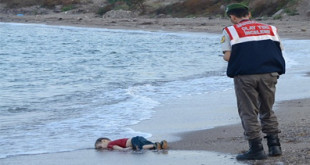 During a recent Round Table in Ankara, Admiral James Winnfeld, Vice-Chairman of the U.S. Joint Chiefs of Staff, announced that Washington would reveal its intentions toward Syria once the 6 November presidential elections were over. He made it plainly understood to his Turkish counterparts that a peace plan had already been negotiated with Moscow, that Bashar al-Assad would remain in power and that the Security Council would not authorize the creation of buffer zones. For his part, Herve Ladsous, the U.N. Assistant Secretary General for Peacekeeping Operations, announced that he was studying the possible deployment of peacekeepers ("blue helmets") in Syria.
During a recent Round Table in Ankara, Admiral James Winnfeld, Vice-Chairman of the U.S. Joint Chiefs of Staff, announced that Washington would reveal its intentions toward Syria once the 6 November presidential elections were over. He made it plainly understood to his Turkish counterparts that a peace plan had already been negotiated with Moscow, that Bashar al-Assad would remain in power and that the Security Council would not authorize the creation of buffer zones. For his part, Herve Ladsous, the U.N. Assistant Secretary General for Peacekeeping Operations, announced that he was studying the possible deployment of peacekeepers ("blue helmets") in Syria.
All regional actors are preparing for the cease-fire which will be overseen by a U.N. force composed principally by troops of the Collective Security Treaty Organization (Armenia, Belarus, Kazakhstan, Kyrgyzstan, Russia, Tajikstan). These events signify that the United States is effectively continuing a process, begun in Iraq, of retreat from the region and has accepted to share its influence with Russian.
At the same time, the New York Times revealed that direct negotiations between Washington and Iran are slated to restart even as the United States continues its attack on Iranian monetary values. It is becoming clear that, after 33 years of containment, Washington is acknowledging that Teheran is an established regional power, all the while continuing to sabotage its economy.
This new situation comes at the expense of Saudi Arabia, France, Israel, Qatar and Turkey all of whom had placed their bets on regime change in Damascus. This diverse coalition is now suffering divisions between those demanding a consolation prize and those trying to sabotage outright the process underway.
Ankara has already changed its tune. Recep Tayyip Erdogan, previously ready for the worst, is now actively seeking reconciliation with Teheran and Moscow. Several days after insulting the Iranians and harrassing the Russian diplomats in his country, he is now all smiles. He took advantage of the Organization of Economic Cooperation in Baku to approach President Mahmoud Ahmadinejad. He proposed a complex framework for discussing the Syrian crisis which would allow Turkey and Saudi Arabia not to be left by the wayside. Careful not to humilate the losers in the conflict, the Iranian president indicated he was open to such an initiative.
As for Qatar, it is already seeking new horizons for its ambitions. Emir Hamad took off on a trip to Gaza, posing as the self-appointed protector of Hamas. He advocates the overthrow of the King of Jordan, the transformation of the Hashemite monarchy into a Palestinian republic and the installation in power of his proteges from the Muslim Brotherhood.
Only Israel and France remain in the opposition camp. The new scheme would offer a guarantee of protection to the state of Israel but it would also alter its special status on the international scene and end its expansionist dreams. Tel-Aviv would be relegated to being a secondary power. France, also, would lose influence in the region, particularly in Lebanon. Accordingly, the intelligence services of both states have concocted an operation to collapse the U.S.-Russia-Iran agreement which, even if it fails, would allow them to erase the traces of their involvement in the Syrian crisis.
France started by circulating the rumor that President Bashar al-Assad sponsored a Hezbollah plan to assassinate five Lebanese leaders: the head of the security forces, the head commander of the Ministry of the Interior, the Grand Mufti, the Maronite Patriarch and former prime minister, Fouad Siniora. Then, Paris took out Michel Samaha, who had served as liaison to the Syrian armed forces but who, having been disgraced in Damascus, was no longer of use. This brilliant and adept politician fell into the trap set for him by General Wassam el-Hassan, head of the Free Syrian Army and himself a liaison with the Salafists. Next, Paris eliminated General Wassam el-Hassan himself, who had not only become useless in the eventual advent of peace in Syria but also dangerous because of what he knew. The French rumor became reality : the number one name on the list of targets is dead and a pro-Syrian figure was arrested as he was preparing an attack on another name on the list.
At the core of these machinations is General Puga. The former Commander of Special Operations and Director of French Military Intelligence was the head of the personal general staff of President Nicolas Sarkozy and has been retained in that post by Francois Hollande. Linked by his unconditional support for the Jewish colonial occupation of Palestine [1] and having close connections to American neoconservatives, he carried forward French colonial policies in the Ivory Coast, Libya and Syria. Bypassing democratic institutions, he determined on his own the direction of French policy in the Middle East, despite his having no official appointment.
[1] "Gaza: France oversees the extension of the Separation Wall,"Voltaire Network, 26 December 2009.
Translated from French by Michele Stoddard.
Post Disclaimer | Support Us
Support Us
The sailanmuslim.com web site entirely supported by individual donors and well wishers. If you regularly visit this site and wish to show your appreciation, or if you wish to see further development of sailanmuslim.com, please donate us
IMPORTANT : All content hosted on sailanmuslim.com is solely for non-commercial purposes and with the permission of original copyright holders. Any other use of the hosted content, such as for financial gain, requires express approval from the copyright owners.
 Sri lanka Muslims Web Portal Sri Lanka Muslims News Center
Sri lanka Muslims Web Portal Sri Lanka Muslims News Center
 Donate
Donate


